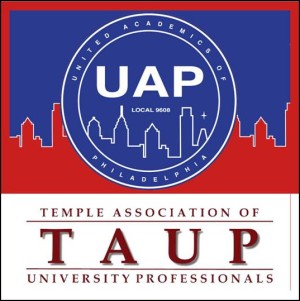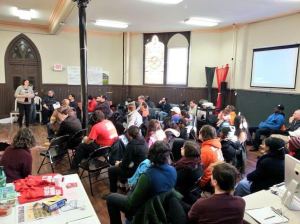This open letter, signed by the Temple University Adjunct Organizing Committee, was originally posted on United Academics of Philadelphia’s website.

National Adjunct Awareness Week Rally, Temple University, February 3, 2015. Photo by Adam D. Zolkover. Licensed CC-BY.
The vast majority of Temple University’s adjunct professors want to have a union. Why? If we are unionized, we can negotiate the terms of our employment and have a voice in the university. Without a union, we cannot.
Right now, Temple adjuncts are at-will employees who work under semester-long appointments for $1300 per credit and without affordable healthcare benefits. We work without any guarantee of future employment regardless of how well we teach and regardless of how long we have taught here. Our classes can be canceled at any time for any reason. Often they are canceled right before the semester starts without compensation for the hours we have already worked preparing the course. Class sizes are increased without additional compensation or without providing us with teaching assistants. And though we are well-qualified, we are very rarely considered for full-time positions at Temple.
If we have a union, then we can address these issues by negotiating a contract with the administration. A fully unionized faculty would benefit the entire university, as adjuncts—who make up half of the faculty—are central to Temple’s mission of educating our students. All undergraduate students at Temple have been taught by adjunct professors and more and more often rely on their former adjunct professors for letters of recommendation and mentorship. Imagine if all of our students’ professors could afford to meet with them (and had space to meet with them) after class rather than running to another job. Imagine if all those requests for letters of recommendation could be answered because their professors were still teaching at Temple. Many do not work here for long because the job is simply unsustainable. If we truly value education, then we must value the people who teach.
At the end of last semester, we filed with the Pennsylvania Labor Relations Board for an election to have a union. Adjuncts would be joining Temple Association of University Professionals (TAUP), the full-time faculty union at Temple, and United Academics of Philadelphia (UAP), the metro-wide union for adjunct faculty. We now await an election date from the PA labor board. Unfortunately, Temple’s administration is delaying the process because they don’t respect us. Provost Dai continues to send misleading and offensive emails to adjunct faculty discouraging us from unionizing. His actions show that he regards us as nothing more than cheap labor. If Temple’s administration values education, they will remain neutral and let us vote yes or no to have a union now. This is a matter of simple justice. Let us vote.
Signed,
The Temple Adjunct Organizing Committee:
Ryan Eckes, English
Wende Marshall, Anthropology
Jennie Shanker, Tyler School of Art
Paul Dannenfelser, Social Work
Carrie Young, Social Work
Maggie Avener, Math
Kelli Jones, Math
J. Tucker Taylor, Economics
Linda Lee, Mosaics
Ian Davisson, Mosaics
Melissa DeGezelle, Mosaics
Rob Kesselman, Music
Aaron Levinson, Media Studies & Production
Donald Deeley, English
Carolina Maugeri, English
Elizabeth Spencer, English
Naomi Levine, Film & Media Arts
David White, Theater
Abner Rodriguez, Engineering
Martha Carey, Education

